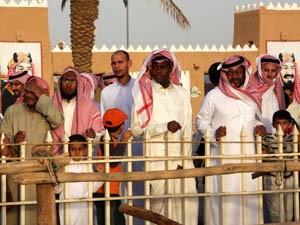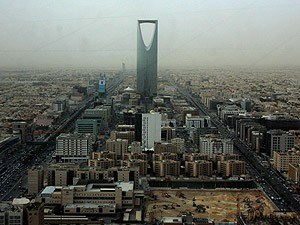Saudi Arabia – Km 70,220
In 2003, I tried to visit Saudi Arabia from Eritrea, but its restrictions to get the visa prevented me to do it. Five years later, with almost 50.000 km more covered, I arrived in Kuwait, from where I believed that it would be easier to enter to Saudi, but there I neither got my visa. For it when I was in Bahrain and the Argentina Embassy from Riyadh informed me that my visa was ready I jumped for joy, because finally I could know what is for the western culture the country more difficult of understanding.
Along my trip I was also interested in the holy places, about different religions and their messages. For it, after almost two years of travelling through the Islamic world, Saudi Arabia was one of the most wished countries to visit, because it is the Prophet Mohammed land, because the faith of his followers makes of Mecca one of the biggest pilgrim centers of world and because here the religion has a fundamental role in each aspect of the daily routine.
When I crossed the bridge which separates Bahrain from Saudi, I cycled to Al Khobar, a city which is situated on the coast, in the east part of the country. There, Bilal, the local responsible of the Public Relationships of the Youth Welfare of the Kingdom of Saudi Arabia was waiting for me. Rashed, Al Heraiwel, the General Secretary of the Saudi Olympic Committee had already requested for me. Once that I arrived to the youth hostel Bilal invited me to have dinner to a museum restaurant where we talked during hours. He was very curious about my trip and me too about their traditions. According he explained to me, the Saudis are proud of their Bedouin origins and of their Islamic tradition which is based on its five pillars: Profession of Faith, the Prayers, Giving of Alms, Fasting during Ramadan and the Pilgrimage to Mecca.
The Profession of Faith is the ritual by means of which a person professes his adhesion to the Islam pronouncing in Arabic that that translated it says: “I give faith that there is not more divinity than God and Mohammed is the messenger of God”. This statement accompanies the Muslims during all their life. It is whispered in the ear to the babies, and to the moribund ones, they are helped to pronounce it.
The second pillar is the Prayer which consists on the recital of certain verses of the Koran, accompanied by a series of inclinations, five times per day: at dawn, noon, mid-afternoon, dusk, and night; and always on a carpet and facing towards the Kaaba in Mecca, the spiritual center of the Islam. But before praying the Muslim must wash his face, hands, head and feet, and in case of not having water, he can practice the dry wash, with clean sand.
During my stay in Saudi, what attracted my attention was that all the shops, restaurants, banks or services close their doors or stop of working during the prayer, even the shopping centers. For it when I was in the line to pay in the supermarket, I had to wait half an hour, because the cashiers went to pray.
The alms giving is the third pillar of the Islam. The Muslims have to give every year a charity to poorest people in their community, beginning for family and neighbours equivalent to 2,5% of their savings.
The fourth pillar is the fast which is carried out in the month of Ramadan, the ninth month of the Muslim calendar, when the first quarter of the moon begins. It is made during every day of the month from dawn to dusk. During the fasting Muslims cannot ingest anything solid or liquid, neither they can smoke or to have sex. According they explained to me the purpose of the fasting allows to the faithful of becoming purified spiritually and physically to come closer much more to Allah, giving the possibility to them of eradicating the bad habits. It is why during this month the life of the Muslims changes sensibly, when they live more at night.
The fifth pillar of the Islam is the pilgrimage to Mecca. All Muslim must visit the most sacred city in the Islamic world at least once in the lifetime, as long as they have the economic way and the necessary conditions of health.
Because it is believed that there God ordered to Abraham to build the Kaaba, a stone sanctuary so that summons the whole humanity to visit it, but after some time the men forgot its meaning and they practiced the idolatry there, straying of the suitable way gave by God; until the Islam arrived preached by its prophet Mohammed and the place came back to be the saint house of God again. The Kaaba is an old stone building covered with a black cloth embroidered in gold and it is the symbolic reference place toward where the Muslims pray their prayers. The pilgrims also often take advantage of the pilgrimage to visit Medina’s city, where Mohammed and other founders of the Islam are buried.
According Bilal explained to me, many Muslims save during a lifetime to be able to make this trip which represents a deeply spiritual experience, purifying their sins, reaffirming their faith and giving behaviour to their lives. For it those that carry out the pilgrimage will enjoy a great respect to the return to their countries. For almost all the Muslims, it is the most important objective in their lives.
Way to Riyadh, the capital city
It took me four days to cycle from Al Khobar to Riyadh, through a practically isolated road between dunes and with a strong head wind. But the unusual thing was that the first two days I was escorted by different patrol cars which each 30 km were relieved. According they explained to me it was for my security and for it I didn’t mind, although it made me sad for who drove, because I cycled 12 km/h. I remember that the second morning I asked to the driver of the patrol car to drive ahead of me to cut the strong head wind instead of escorting me. And he didn’t have problem, so I cycled 15 or 16 km/h. But later the new official who began to escort me and who seemed in a hurry got angry when I stopped to have lunch in a petrol station, or when I stopped to take a picture a couple of times. So when he ordered me to keep cycling I answered him in a bad tone, tired and furious. Maybe for it, the last two days to the capital city the patrol cars only came closer some minutes and then they left. And I preferred it, because I am not really used to have a patrol car escorting me the whole time.
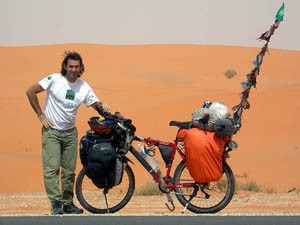
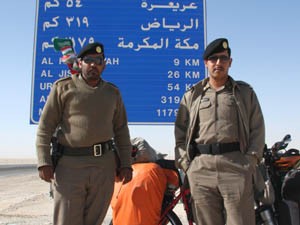
When I arrived to Riyadh, Samy received me, who works for the Youth Welfare. According to him each traveller who arrives to the Kingdom of Saudi has to register and to be attended by them. And he was really very kindly; he organized my stay at the youth hostel, where I got a private room with all the meals at the restaurant. Due to Samy believed that could be dangerous to go around the city with my bicycle he also organized small tours to the most interesting places and he took me where I needed to go. So we became friends; we talked about the history of Saudi and about the present and their traditions. He also took me to the private hospital to see a doctor, because I felt strong stomach pain. There I was treated very well, and they also gave me the medicines for two months of treatment. But I have to admit that for moments I felt that my friend Samy also controlled me, because when I left the hostel alone, he phoned me and asked me where I was, what time I had left and what time I was planning to go back. “Bureaucracy Pablo” Samy told me, “I have to report everything”. Anyway I only have words of gratefulness for him and all his administration, although for moments he made me feel as if I was a spy.
The Saudi Arabia origin
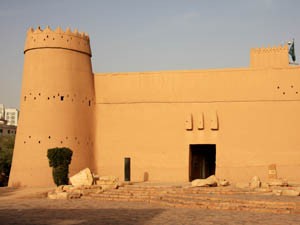
Around 1750, in the Arabic peninsula a local governor of the family Saud arises and he united forces with the Islamic theologian, Muhammad Al Wahhab, creator of the religious sect of the wahabismo, establishing a new political identity. During the following 150 years, the Saud family arose and fell several times, facing the rulers from Egypt, of the Ottoman Empire and other powerful families from Arabia. But finally at the beginning of the XX century, the State of Saudi Arabia was settled down for who then would be its King, Abd al-Aziz ibn Saud.
This way after the mutual support, the wahabismo that had the aim of restoring the purity of the Islamic religion contaminated by innovations, deviations and idolatry was introduced as the right way of practicing the Islam in the Kingdom. But from 1960 and especially in the decade of 1970, a liberal movement toward an openness with the west arose. This movement was abruptly reverted when the Great Mosque of Mecca was attacked by ultraconservative religious groups, opposed to the Saudi monarchy, at the same time that the Islamic Republic of Iran was constituted. This activism denominated fundamentalism for the western world, treated that the governments of the Muslim countries establish the Islamic laws and their practical social. This way while the religious leader from Iran, Ayatollah Khomeini requested the dismissal of the king Al Saud, the Saudi government was forced to follow a much more conservative politics about the practices of the Islam in the country, stopping the cultural changes coming from west. Also the Saudi government with Sunnite origin was threatened by the big population Shiite who lived in Saudi Arabia.
In the following years to these events an important conservative movement took place that influenced in people’s performance, in the government’s politicians, in the sermons in the mosques and in the treatment toward the foreigners. The religious programs of radio and television increased as well as the articles about religion in the newspapers. These changes also influenced in people’s dress that already was conservative. According to the Islam, men and women must dress in a worthy and modest way in public areas. I remember when Samy who sometimes dressed in a western way, explained to me why he wears his Arab characteristic clothes: white, long and with a blanket in his head; every time that we visited a museum or a government place: “simply to be respected” he said to me.
This way the observation of the Islamic laws, considered previously as a responsibility of the family, have been absorbed by the government to assure their execution, and that that formerly was a non official practice, it was sanctioned as a law, for example: the prohibition that the women can drive. Too, currently the cinemas are forbidden, as well as the practice of any other religion.
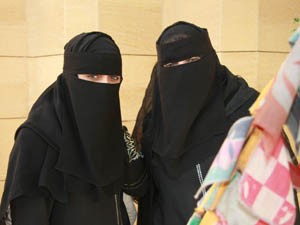
For it, from the conservative movement resurgence, the Mutawa who is the religious police has increased its participation considerably in the Saudi daily. They are who watch over the abstinence of eating, drinking or smoking during the period of Ramadan. Also those that watch over that the stores are closed in the hours of daily prayers and that the dress of the citizens is the appropriate one. According people explained to me the Mutawa have the authority of arresting men and women who don’t have family nexuses and are together whether they are in a coffee or travelling in the same car, because the Mutawa are the “Entity for the Promotion of the Virtue and the Prevention of the bad habit”. But sometimes they go far beyond. The worst episode happened in 2002, when it was avoided to girls to escape from a school set on fire in Mecca because they didn’t wear the veil and the Islamic blanket; and because there was not any male relative to pick up them. It was also said that the religious police prevented the firemen from entering to the school, for not mixing with the women. As result 15 girls died and 50 were hurt. Later those Mutawas were condemned by the religious judges.
Saudi Arabia it is one of the Islamic countries which has adopted the Sharia as law in the State. The Sharia is a religious code to live, with its sources in the Koran and in the Hadith. The Hadith is the summary of the acts and sayings of the Prophet Mohammed, “but it was written 200 years after his death” Abdu told me, an Egyptian immigrant who criticized the Sharia strongly. For it, crimes in Saudi Arabia like murder, rape, drug dealing, witchcraft, armed robbery, adultery, homosexuality and even the disobedience of the women toward the father’s authority or her husband can be punished severely. The hardships can vary: flogging, stoning, even the subtraction of a hand or the decapitation. But according to some Saudis it doesn’t happen more, although other Arab immigrants told me that it often happens.
The Sharia also includes as gross misconduct the non execution of the norms of the women clothes, to who, in case of non-fulfilment, they are considered as immoral and sometimes guilty in case of rape.
As at home
I stayed in the capital city more than one month, where I met very nice people, like the people of the Argentina Embassy; who its Consul Carlos Erausquin and his wife Teresa treated me like a son; they invited me to eat many times to their house and Teresa always worried because I was alone. She cooked me several times Argentinean food and exquisite desserts, she remembered me my mother´s cooking; I really felt like home. Then, through them I met Monica and her family, who were from Spain but they are living in Saudi since long time. And I was lucky because Monica is the Marketing Manager of Shumou Investment Co, a Saudi company; and together to her boss they decided to sponsor me with one of their products: Olivier & Co. For it, she organized an event in one of their shops at the shopping where journalist from several newspapers and even the TV were present. In the follow day we were invited by a couple of alive TV programs.
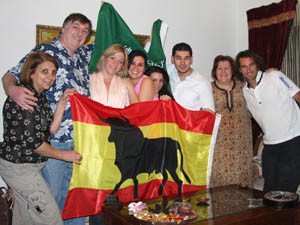
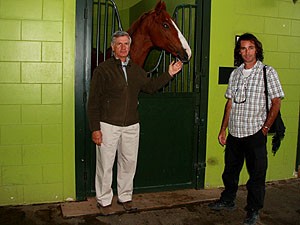
During the last days of my stay the Marriott hotel also sponsored me and his PR Manager organized a press conference; then I visited the Janadriyah Festival which shows the traditions and music of the whole country and I went to the King Abdul Aziz Horse Track with Julio, an Argentinean who trains the King’s horses. I also enjoyed driving a Kart on the formula 3 circuit with Luis and Ashraf.
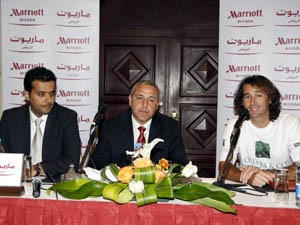
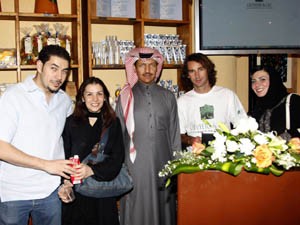
The marriage in the most traditional way
I took five day of cycling from Riyadh to the border of Qatar, and once more I was escorted by the police, all time, because as they said to me they were worry about my security. In several occasions they invited me to eat with them and at night they always helped me to find a place to sleep or to camp. In Al Hofuf I also stayed in the Sport Center of the city for several days, where Mohamed and Mustafa treated me very well: “It is our duty to help you” they told me, “It is our house, this is our culture and we want that you leave Saudi with the best memories.“
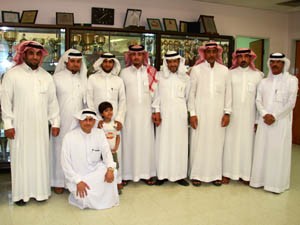
Talking with Mustafa I was curious about how according to traditions young people get married. He told me that is the mother of the boy and his sisters who look for the possible candidate according to his pretention, and it happens in others marriage ceremonies. For it, the women who don’t join with men to celebrate, wear the best dresses and jewels, seeming princesses. Because it is there that they will find their future mother-in-law.
Then, once that the candidate is chose, the boy and his family tend to ask to their relatives, friends or neighbors about the girl and her family, for example if they are nice people. If they approve the boy calls to the girl’s father and he requests him a meeting to introduce himself and ask for his daughter´s hand in marry. In this first meeting the man have to tell him about his profession, his work and his good intentions, but he doesn’t still see the candidate; although she possibly listens to him from some place of the house, spying him. Past some days, the girl and her family think. Then they contact the boy, and if they are agree, they invite him to the house together to his family, where for the first time he will meet his future wife. As a whole the couple is in a room, accompanied by another members of the girl’s family, where she offers him a tea, she takes off her veil and she smiles him. Although according to the family, some women are presented with more informal clothes so that the boy can see her full-length, because according to the Koran, this is something that is allowed, although most of the men, as they explained to me they just take a look at her because the men are shy and it is also about respect issue.
Also on this meeting between families, the girl’s family, requests the dowry to the man which is directly proportional to his social status, but in general, in Riyadh, it is never smaller to 15.000 u$s, without counting the gift to his mother-in-law which is usually a complete Set of jewels, the expenses of the marry ceremony and the house. After some days the boy has to call again to confirm his interest, because he can still retract if he wishes it, (in case he doesn’t like her, for example). So, this way together to the girl´s father talk about the details of the ceremony, when the bride and groom will meet again. Depend on the family, the future couple can talk on the phone, or to meet each other for a tea at girl´s home, but always with a brother, or another member of her family present. According to Mustafa his marriage which was on this way, is not so different to the rest of marriages in the Islamic world. According to him, husband and wife know each other during the matrimonial life and they have to accept themself just as they are. And he assures me after 9 years of marriage: “I cannot be without my wife, we are happy, and we already have two children.”
As the days passed and I keeped talking with Saudis I convinced me that if to the Arab people, who have an ancient culture and so traditional for many people, is given the opportunity to change leaning toward the western size, most of people would not do it, because they were educated and habituated to these traditions. In spite of the fact that many of them are attracted by that prohibited things that west offers.
It seems that the Muslim society who assures that it is governed by the same Koran which was revealed to its prophet 1,400 years ago, is afraid of lossing its identity and certain habits, considering that a west´s openness would cause the weaking of the family institution. For it they believe that the religion is the guarantee and origin of stability.
For them the family is the pillar of the society, each son is a blessing and the old people are always worshipped and respected. Neither they have the levels of alcoholism and drug addiction which exist in our society.
So, it is very difficult to analyze with our criterion a culture completely different to ours.
But I also understand that the power and the religion walk together hand in hand”, and that through these latitudes, even though a president or monarch wants to make changes he can not do it.
